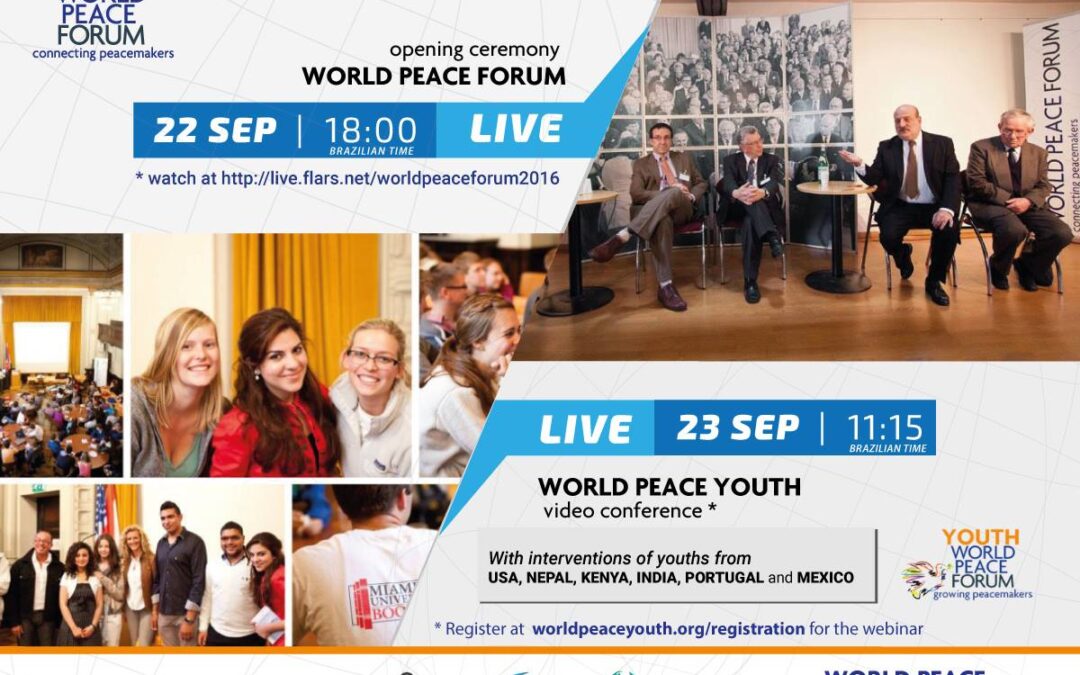
Sep 20, 2016 | Focolare Worldwide
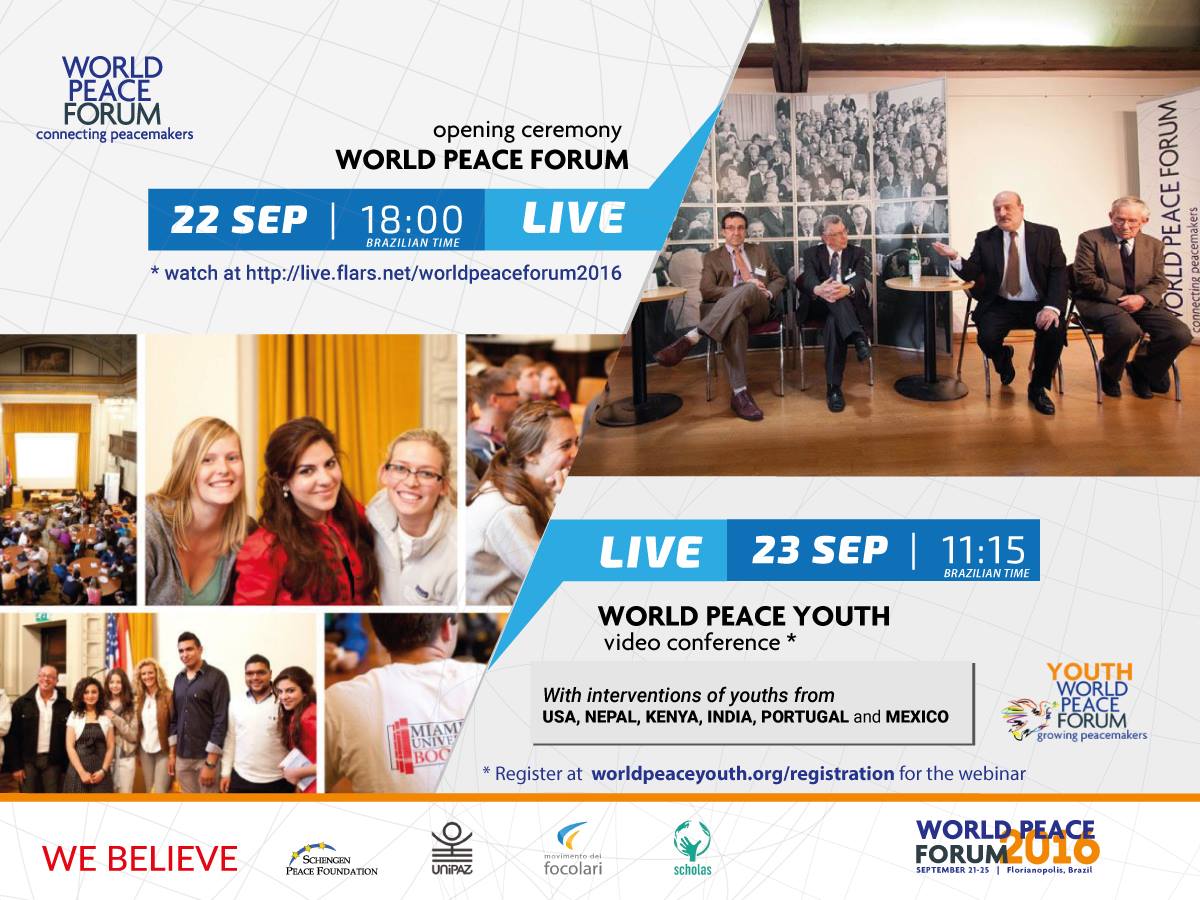 “The World Forum for Peace” will be held in Brazil, in the city of Florianópolis, during 22-25 September.
“The World Forum for Peace” will be held in Brazil, in the city of Florianópolis, during 22-25 September.
The opening ceremony of the 10th World Peace Forum and 2nd Youth World Peace Forum will be transmitted life via streaming on Thursday, 22 September, from 6 pm – 8.30pm (Brazil time)
Live transmission: http://live.flars.net/worldpeaceforum2016 On Friday, 23 September, at 11.15 am (Brazil time), there will be a Youth Video Conference. To register for the live webinar: worldpeaceyouth.org/registration Official Website for World Peace Forum 2016
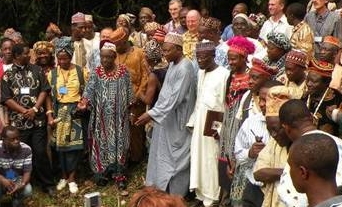
Sep 20, 2016 | Focolare Worldwide
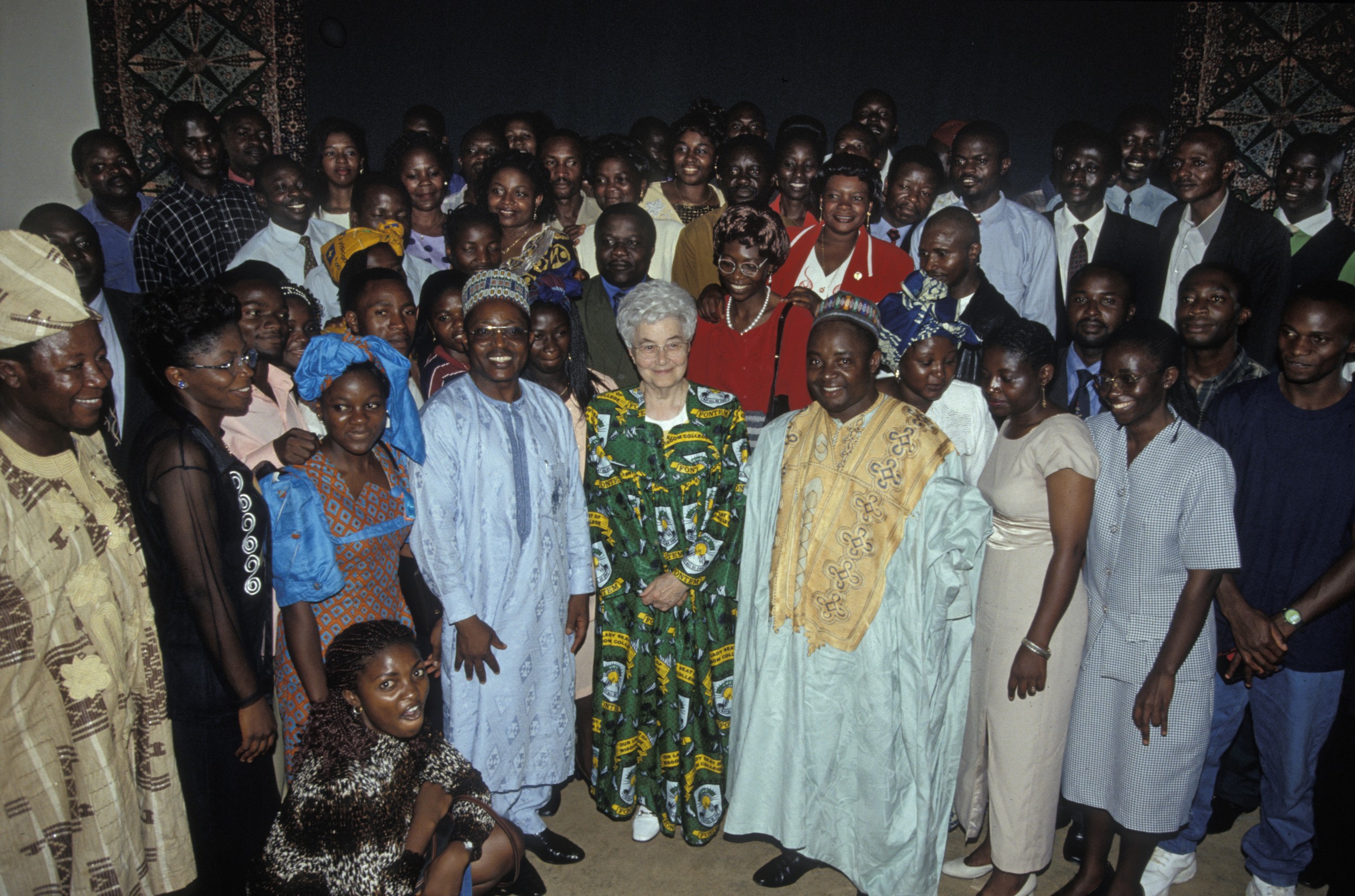 A delegation of 40 people from Cameroon are on their way to Rome. Among them are 9 traditional leaders (Fon), the native Kings of the Bangwa people of Lebialem, South-West Cameroon (Fon-Fontem, Fon-Nwametaw, Fon-Nwangong, Fon- Esoh Attah, Fon-Akum, Fon-Lewoh, Fon-Nkar, Fon-Bamenda and Fon-Douala),who are accompanied by Mafuas (Queens), two Mayors and other distinguished persons. They travel to Italy to celebrate the Jubilee of Mercy with Pope Francis and to thank God for the 50 years that has passed since the Bangwa people and the Focolare Movement met for the first time in Fontem. Their “pilgrimage” starts at the Vatican. They look foward to meet Pope Francis during the General Audience on Wednesday, September 21, when the Fon-Kings will greet the Pope on behalf of the delegation and their peoples, offer gifts typical of their culture and thank him for all that the Church has done for them. During their stay in Italy, they will be guests of the Focolare Movement and they will visit places where Chiara Lubich was born, lived and is buried: Trent, Loppiano (Florence) and Rocca di Papa (Rome). In fact, it was Chiara and the Focolare Movement, who answered the plea of Bangwa people, that came through Msgr Peters, bishop of Buea in the early 60’s, when the endemic sleeping sickness and other tropical diseases provoked a 90% rate of infantile mortality, threatening the extinction of the whole population. Today, these diseases have almost disappeared and the hospital, with its outpatient clinics, laboratory, operating theatre, male and female internal medicine department, surgery, maternity and pediatrics departments and the new department for infectious diseases, excels in the healthcare for the whole region. In the early70’s, a power plant, a carpentry shop, a nursery school and college were also built. The college,which takes more than 500 students, is one of the most popular pre-university insitutions in Cameroon.
A delegation of 40 people from Cameroon are on their way to Rome. Among them are 9 traditional leaders (Fon), the native Kings of the Bangwa people of Lebialem, South-West Cameroon (Fon-Fontem, Fon-Nwametaw, Fon-Nwangong, Fon- Esoh Attah, Fon-Akum, Fon-Lewoh, Fon-Nkar, Fon-Bamenda and Fon-Douala),who are accompanied by Mafuas (Queens), two Mayors and other distinguished persons. They travel to Italy to celebrate the Jubilee of Mercy with Pope Francis and to thank God for the 50 years that has passed since the Bangwa people and the Focolare Movement met for the first time in Fontem. Their “pilgrimage” starts at the Vatican. They look foward to meet Pope Francis during the General Audience on Wednesday, September 21, when the Fon-Kings will greet the Pope on behalf of the delegation and their peoples, offer gifts typical of their culture and thank him for all that the Church has done for them. During their stay in Italy, they will be guests of the Focolare Movement and they will visit places where Chiara Lubich was born, lived and is buried: Trent, Loppiano (Florence) and Rocca di Papa (Rome). In fact, it was Chiara and the Focolare Movement, who answered the plea of Bangwa people, that came through Msgr Peters, bishop of Buea in the early 60’s, when the endemic sleeping sickness and other tropical diseases provoked a 90% rate of infantile mortality, threatening the extinction of the whole population. Today, these diseases have almost disappeared and the hospital, with its outpatient clinics, laboratory, operating theatre, male and female internal medicine department, surgery, maternity and pediatrics departments and the new department for infectious diseases, excels in the healthcare for the whole region. In the early70’s, a power plant, a carpentry shop, a nursery school and college were also built. The college,which takes more than 500 students, is one of the most popular pre-university insitutions in Cameroon.  These 50 years built on facts and involving the whole region of Lebialem, led tens of thousands of people to accept the Christian message, in their personal life and in the life of society. They were supported by the work of the Mill Hill missionaries, the White Fathers and religious men and women of other congregations, who contributed towards the setting up of parishes, of the recent diocese of Manfi, of other schools and of public and administrative State structures. The baggage of the delegation led by the nine Fons contains this story of their people, a story which makes them feel the need to thank God and “Mafua Ndem Chiara Lubich” (queen sent by God), as the Bangwa people call her.
These 50 years built on facts and involving the whole region of Lebialem, led tens of thousands of people to accept the Christian message, in their personal life and in the life of society. They were supported by the work of the Mill Hill missionaries, the White Fathers and religious men and women of other congregations, who contributed towards the setting up of parishes, of the recent diocese of Manfi, of other schools and of public and administrative State structures. The baggage of the delegation led by the nine Fons contains this story of their people, a story which makes them feel the need to thank God and “Mafua Ndem Chiara Lubich” (queen sent by God), as the Bangwa people call her.
Press Conference with the Bangwa Delegation on Wednesday, September 21 at 12.30 (after the audience with Pope Francis)at J.H. Newman Hall, Urban University.
See also: http://focolare-fontem.org/
Video: General Hospital, Fontem
Press releases
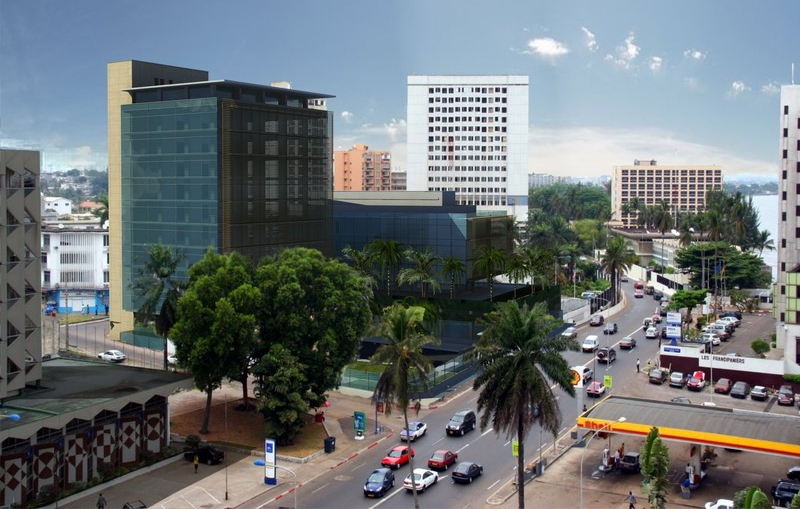
Sep 14, 2016 | Focolare Worldwide
 “When I was invited to visit the Focolare communities in Gabon, I searched for it on Google Earth to find out where on the African continent it was located. It’s actually a small country that is hardly ever talked about. Yet, perhaps few places on earth are so beautiful, rich in natural resources (oil, precious wood, extinct species that are still in existence, 800 km of coastland, the ocean of your dreams. . . .). That’s without saying anything about the people: more than 2 million citizens from 40 ethnic groups, Christians, Animists and Muslims, all living together in peace and – I have to stay it! – an extraordinary ability to welcome and include everyone, as I was able to experience for myself. Currently, Gabon is in a complicated political impasse, following the elections of August 27th and an announcement of victory for one of the presidential candidates. There has been a strong call for transparency both from within and outside the country, from the international community. There is also a strong call to reveal the final election results in each of the regions – as prescribed by the Gabonaise Constitution. The majority of the population are not convinced by the results that have actually been reported, and people have poured into squares in the capital city of Librevelle and in the industrial city Port-Gentil. The demonstrations were contained and repressed with an uncertain number of deaths and many arrests. Non-official means of communication and social networks have been blocked, making it difficult for me to receive news from my friends with whom I spent unforgettable days living the Gospel. It was they who managed to contact me, reporting that all are well and how they’re living through the situation. “Thanks for holding us in your heart!” they write from Libreville. “Unfortunately it’s true that the country is going through violence following the elections. Tensions are high and we’ve been told to stock up on water and basic necessities, and to stay inside our homes. Supermarkets have been ransacked. The communications media is in the hands of the government, and internet is available for only short periods of time between 8:00 and 14:00. Messaging, Facebook and Whatsapp are all blocked. There is a strong and visible military presence on the roads. Total confusion since the election results were announced in this free and democratic land. We’re still waiting for an announcement from the Constitutional Court, with the possibility of even more disorder. People are fearful for the near future of Gabon.” I also received news from Port-Gentil: “We’re well, thanks be to God. Internet access has been limited and complicated since August 31st. We hope it will be active again soon, since it’s such an important communication tool. Last week we were closed inside our houses, unable to go out because of the total chaos on the streets of Port-Gentil and many other places in the country. Moments like these remind of the importance of prayer.” Before saying goodbye to each other we had made a pact, committing ourselves to be peacebuilders, builders of unity and dialogue with everyone in our own work and family environment. Now is more than ever the moment to do it with the support of many other people around the world who live and work for a more united world.” Before saying goodbye to each other we had made a pact, committing ourselves to be peacebuilders, builders of unity and dialogue with everyone in our own work and family environment. Now is more than ever the moment to do it. We were further encouraged by what Pope Francis said yesterday, September 11th to those who were gathered with him in Saint Peter’s Square: “I entrust to the Lord the victims of the clashes and their families. I join the Bishops of that dear African country to invite the parties to reject all violence and to always aim for the common good. I encourage everyone, particularly Catholics, to be builders of peace within the law, in dialogue and fraternity.”
“When I was invited to visit the Focolare communities in Gabon, I searched for it on Google Earth to find out where on the African continent it was located. It’s actually a small country that is hardly ever talked about. Yet, perhaps few places on earth are so beautiful, rich in natural resources (oil, precious wood, extinct species that are still in existence, 800 km of coastland, the ocean of your dreams. . . .). That’s without saying anything about the people: more than 2 million citizens from 40 ethnic groups, Christians, Animists and Muslims, all living together in peace and – I have to stay it! – an extraordinary ability to welcome and include everyone, as I was able to experience for myself. Currently, Gabon is in a complicated political impasse, following the elections of August 27th and an announcement of victory for one of the presidential candidates. There has been a strong call for transparency both from within and outside the country, from the international community. There is also a strong call to reveal the final election results in each of the regions – as prescribed by the Gabonaise Constitution. The majority of the population are not convinced by the results that have actually been reported, and people have poured into squares in the capital city of Librevelle and in the industrial city Port-Gentil. The demonstrations were contained and repressed with an uncertain number of deaths and many arrests. Non-official means of communication and social networks have been blocked, making it difficult for me to receive news from my friends with whom I spent unforgettable days living the Gospel. It was they who managed to contact me, reporting that all are well and how they’re living through the situation. “Thanks for holding us in your heart!” they write from Libreville. “Unfortunately it’s true that the country is going through violence following the elections. Tensions are high and we’ve been told to stock up on water and basic necessities, and to stay inside our homes. Supermarkets have been ransacked. The communications media is in the hands of the government, and internet is available for only short periods of time between 8:00 and 14:00. Messaging, Facebook and Whatsapp are all blocked. There is a strong and visible military presence on the roads. Total confusion since the election results were announced in this free and democratic land. We’re still waiting for an announcement from the Constitutional Court, with the possibility of even more disorder. People are fearful for the near future of Gabon.” I also received news from Port-Gentil: “We’re well, thanks be to God. Internet access has been limited and complicated since August 31st. We hope it will be active again soon, since it’s such an important communication tool. Last week we were closed inside our houses, unable to go out because of the total chaos on the streets of Port-Gentil and many other places in the country. Moments like these remind of the importance of prayer.” Before saying goodbye to each other we had made a pact, committing ourselves to be peacebuilders, builders of unity and dialogue with everyone in our own work and family environment. Now is more than ever the moment to do it with the support of many other people around the world who live and work for a more united world.” Before saying goodbye to each other we had made a pact, committing ourselves to be peacebuilders, builders of unity and dialogue with everyone in our own work and family environment. Now is more than ever the moment to do it. We were further encouraged by what Pope Francis said yesterday, September 11th to those who were gathered with him in Saint Peter’s Square: “I entrust to the Lord the victims of the clashes and their families. I join the Bishops of that dear African country to invite the parties to reject all violence and to always aim for the common good. I encourage everyone, particularly Catholics, to be builders of peace within the law, in dialogue and fraternity.”
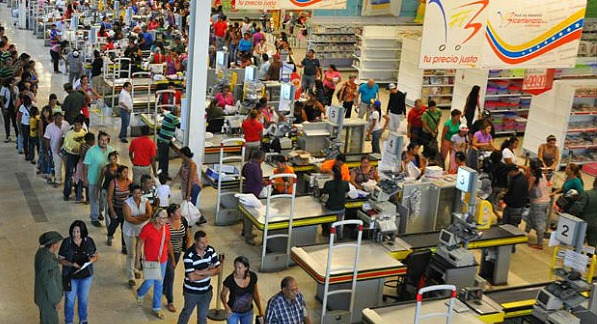
Sep 12, 2016 | Focolare Worldwide
 The news reaching us from Venezuela is not at all comforting. Furthermore, the Latin American Country is not only exhausted but also divided. In this framework, the Focolare community is making every effort to create reconcilement and solidarity, sharing all they have. The community of Colinas de Guacamaya (Valencia), after asking themselves in what way they could face this time of social, political and economic crisis that is reaching its peak, has responded by doubling their commitment to putting into practice the Gospel’s new commandment of mutual love, starting from the small daily gestures. One of them wrote: «Today, while I was buying 12 rolls of toilet paper at the supermarket, I thought of the many people here in Venezuela, who can find none on the shelves even if they had the money. I called a friend who was happy with the news and she asked me to get some for her. In turn she asked me if I needed anything, and so I told her that there was no more soap in the house. “Ah – she answered – I can give you some, and what’s more, you can take with you also some bananas which my son has just brought.” Once again I experienced concrete love, and when it circulates, that promise, “give and you shall be given,” which Jesus talked about, becomes a reality.» Those are simples acts, but also extreme ones, if we consider that for a stolen mango, people get to kill one another. Another woman recounted: «At the start of the day I met someone who was looking for cooking oil, and since I had some, I shared it with her; after a while I met another person who needed an injection, and so I administered it with great care. Much later a woman came knocking: her little girl had a bad case of flu and needed the nebulizer which luckily I had, and which I had already lent to many people. While passing by a friend’s house, I took the opportunity to ask if she needed anything: “Yes, some detergent for the laundry,” she said. I ran home to get mine and halved it with her. Since my husband works on the night shifts, in the evening some member of the community keeps me company. Having received an act of solidarity, I took the opportunity to prepare the dinner, knowing that there were those who did not have enough food. Upon examining my day before falling asleep, I feel a great joy: we have lived for one another, and together helped each other to live the Gospel. Tomorrow will give me another opportunity to see in every person that passes me by, the special presence of God.» The problems of the country are so great that these daily narrations may appear to be naive, or insignificant, like small drops in the ocean, and we all hope that solutions may come at the political, economic and social levels. Mother Theresa of Calcutta affirmed that “what we are doing is just a drop in the ocean, but if we fail to do this, the ocean would have a drop less.” It seems that this small community of Venezuela also has the same conviction.
The news reaching us from Venezuela is not at all comforting. Furthermore, the Latin American Country is not only exhausted but also divided. In this framework, the Focolare community is making every effort to create reconcilement and solidarity, sharing all they have. The community of Colinas de Guacamaya (Valencia), after asking themselves in what way they could face this time of social, political and economic crisis that is reaching its peak, has responded by doubling their commitment to putting into practice the Gospel’s new commandment of mutual love, starting from the small daily gestures. One of them wrote: «Today, while I was buying 12 rolls of toilet paper at the supermarket, I thought of the many people here in Venezuela, who can find none on the shelves even if they had the money. I called a friend who was happy with the news and she asked me to get some for her. In turn she asked me if I needed anything, and so I told her that there was no more soap in the house. “Ah – she answered – I can give you some, and what’s more, you can take with you also some bananas which my son has just brought.” Once again I experienced concrete love, and when it circulates, that promise, “give and you shall be given,” which Jesus talked about, becomes a reality.» Those are simples acts, but also extreme ones, if we consider that for a stolen mango, people get to kill one another. Another woman recounted: «At the start of the day I met someone who was looking for cooking oil, and since I had some, I shared it with her; after a while I met another person who needed an injection, and so I administered it with great care. Much later a woman came knocking: her little girl had a bad case of flu and needed the nebulizer which luckily I had, and which I had already lent to many people. While passing by a friend’s house, I took the opportunity to ask if she needed anything: “Yes, some detergent for the laundry,” she said. I ran home to get mine and halved it with her. Since my husband works on the night shifts, in the evening some member of the community keeps me company. Having received an act of solidarity, I took the opportunity to prepare the dinner, knowing that there were those who did not have enough food. Upon examining my day before falling asleep, I feel a great joy: we have lived for one another, and together helped each other to live the Gospel. Tomorrow will give me another opportunity to see in every person that passes me by, the special presence of God.» The problems of the country are so great that these daily narrations may appear to be naive, or insignificant, like small drops in the ocean, and we all hope that solutions may come at the political, economic and social levels. Mother Theresa of Calcutta affirmed that “what we are doing is just a drop in the ocean, but if we fail to do this, the ocean would have a drop less.” It seems that this small community of Venezuela also has the same conviction.
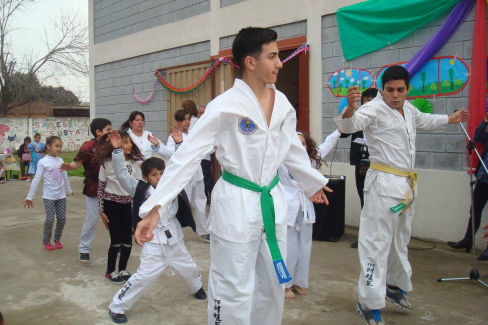
Sep 10, 2016 | Focolare Worldwide, Senza categoria
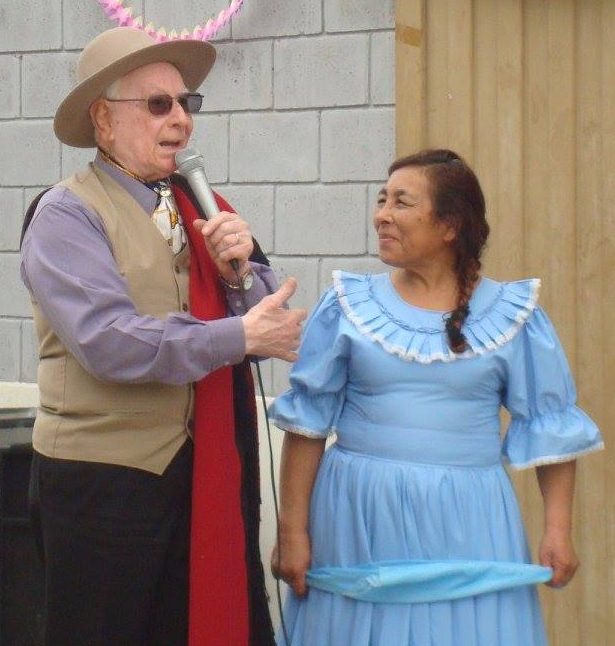 There was must festivity on August 14th at José C. Paz, fifty kilometres from Buenos Aires, Argentina. It was the 10th anniversary of a social centre that hosts the activities of the Juntos Por El Barrio Programme (Together for the Quarter), which is a social project that focuses especially on children, teenagers and their families. Even though the building is ten years old, the project began its work long before and, as is often the case, it was the people from the quarter that had initiated and carried it out. When Francis, the Pope from Argentina, invited everyone to take care of the peripheries, he was probably thinking about settlements like the barrio where the social centre is located. It is a residential settlement that was haphazardly put up behind some buildings by families that had moved to the city in search of fortune. Unfortunately, that fortune was nowhere to be found. The overwhelming unemployment made them even poorer and more vulnerable to every sort of threat: marginalization, alcoholism, drugs, violence and prostitution. And the ones most threatened were the many children and teenagers that spent most of their time on the streets.
There was must festivity on August 14th at José C. Paz, fifty kilometres from Buenos Aires, Argentina. It was the 10th anniversary of a social centre that hosts the activities of the Juntos Por El Barrio Programme (Together for the Quarter), which is a social project that focuses especially on children, teenagers and their families. Even though the building is ten years old, the project began its work long before and, as is often the case, it was the people from the quarter that had initiated and carried it out. When Francis, the Pope from Argentina, invited everyone to take care of the peripheries, he was probably thinking about settlements like the barrio where the social centre is located. It is a residential settlement that was haphazardly put up behind some buildings by families that had moved to the city in search of fortune. Unfortunately, that fortune was nowhere to be found. The overwhelming unemployment made them even poorer and more vulnerable to every sort of threat: marginalization, alcoholism, drugs, violence and prostitution. And the ones most threatened were the many children and teenagers that spent most of their time on the streets. 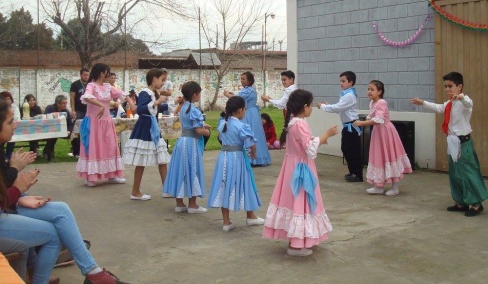 In 1999, with the support of the Focolare that had a meeting hall nearby, some local residents got together to do something for the newcomers. First they tried to identify the main issue for the barrio. It turned out to be the need for a safe place where children and teenagers could be welcomed and taken off the streets. This is how the “Juntos Por El Barrio” Project was begun. An academic support programme was set up in a makeshift classroom. Seeing how successful it was, receiving distance support from the Focolare’s New Families non-profit association (AFN onlus), many other projects were begun. With the help of donations from outside the country a building was constructed where the activities could be carried out. The centre quickly became a meeting place and a point of reference for the entire barrio.
In 1999, with the support of the Focolare that had a meeting hall nearby, some local residents got together to do something for the newcomers. First they tried to identify the main issue for the barrio. It turned out to be the need for a safe place where children and teenagers could be welcomed and taken off the streets. This is how the “Juntos Por El Barrio” Project was begun. An academic support programme was set up in a makeshift classroom. Seeing how successful it was, receiving distance support from the Focolare’s New Families non-profit association (AFN onlus), many other projects were begun. With the help of donations from outside the country a building was constructed where the activities could be carried out. The centre quickly became a meeting place and a point of reference for the entire barrio.  It was therefore necessary to celebrate, also because the quarter is really changing face. At Juntos Por El Barrio there are currently a variety of activities, many of them geared towards the young, but also towards people of all ages: food and nutrition, preventive health, sewing, literacy, artisan and screen printing workshops, classes for gardeners, hair-stylists, tailors and recreational activities. More than 70 families are supported by the project, and the centre is visited by 200 people every week. The 220 people that took part in the August 14th celebrations – including a hundred children – were spurting happiness from every pore. They all felt like protagonists not only of the feast, but also of their own liberation. Perhaps because they felt like they were part of a process in which what comes into light is not giving and receiving, but reciprocity.
It was therefore necessary to celebrate, also because the quarter is really changing face. At Juntos Por El Barrio there are currently a variety of activities, many of them geared towards the young, but also towards people of all ages: food and nutrition, preventive health, sewing, literacy, artisan and screen printing workshops, classes for gardeners, hair-stylists, tailors and recreational activities. More than 70 families are supported by the project, and the centre is visited by 200 people every week. The 220 people that took part in the August 14th celebrations – including a hundred children – were spurting happiness from every pore. They all felt like protagonists not only of the feast, but also of their own liberation. Perhaps because they felt like they were part of a process in which what comes into light is not giving and receiving, but reciprocity.
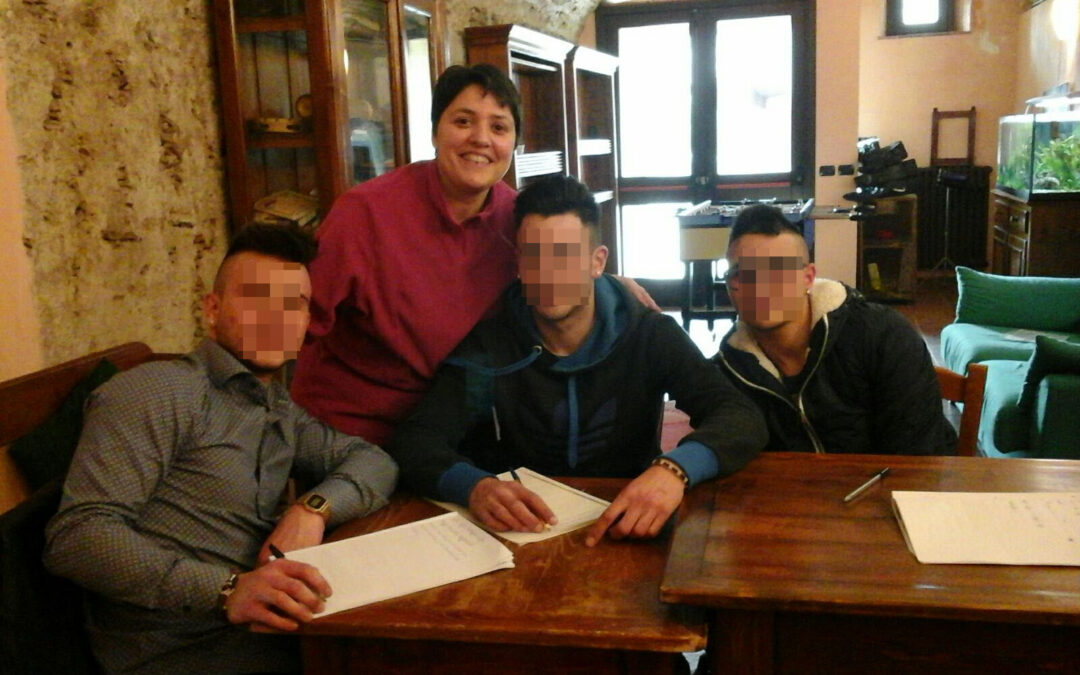
Sep 7, 2016 | Focolare Worldwide, Senza categoria
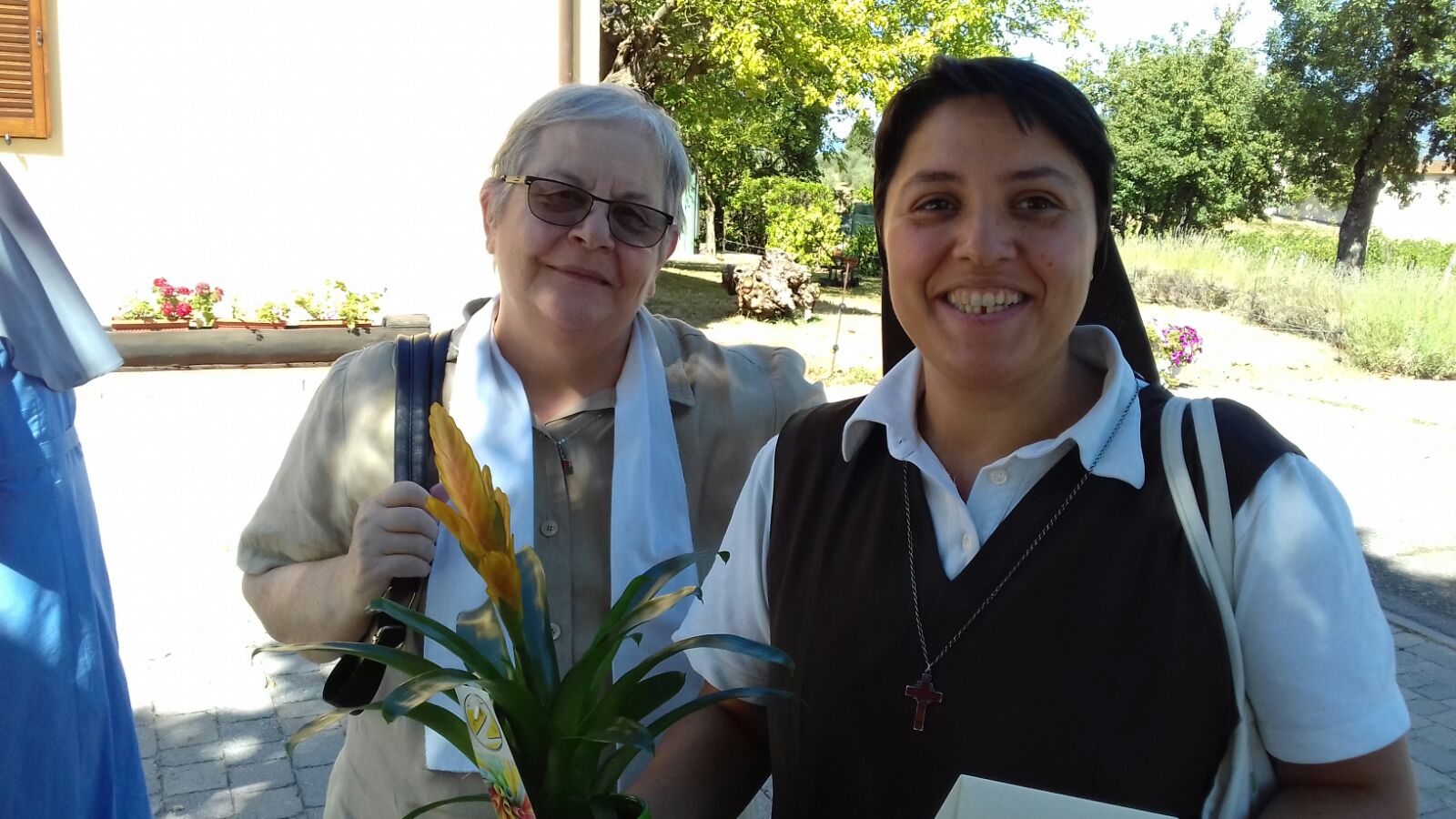 “I come from a simple family in the province of Naples. In my town, my father, a special deacon of the Eucharist, was in charge of the sick and the poor, who had in some way become members of our household. I was14 when dad passed away due to a tumour. I suffered so much, and in that time I didn’t believe that God was taking care of us, as he had always said. I threw myself into my studies, with the objective of earning lots of money to build a house of my own. At the age of 20 God appeared once more in my life: a group of friends had invited me to a meeting of which I honestly remember nothing; the only thing that pushed me to frequent succeeding ones was the joy I saw amongst them, and which was lacking in my life. I excelled in my studies, and had many friends but was not happy like them. I wanted to get to know more about this God they spoke to me about, and after a few years, also what I wanted to do with my life. I was introduced to my congregation almost by chance. To be sincere, I didn’t hold the nuns in great esteem. In my region the convent is still regarded as an escape from the world: and this certainly was not the life I wanted! I am a joyful, happy person and l love being with people. I had a degree and also many boyfriends. But in this religious family I found the love of my life – God, to whom I couldn’t say no. This was the house I had sought ever since I was an adolescent, but now with an addition: I was no longer alone, but had other sisters who loved Jesus, like me. My religious family – the Franciscan nuns of the Poor – had met the Focolare Movement at the turn of the 1960s. That period had been a painful one for the Congregation due to many internal problems. Our charism – to see Jesus in the poor and treat his wounds – in contact with the spirituality of unity, had taken on a new light and the Gospel with its message of mutual love was the answer to all that pain. The nuns created a Youth Centre so that the young girls could find their aim in life. Upon returning to the source of our charism, we also understood that the poor are not only in the sick, but in every suffering person.
“I come from a simple family in the province of Naples. In my town, my father, a special deacon of the Eucharist, was in charge of the sick and the poor, who had in some way become members of our household. I was14 when dad passed away due to a tumour. I suffered so much, and in that time I didn’t believe that God was taking care of us, as he had always said. I threw myself into my studies, with the objective of earning lots of money to build a house of my own. At the age of 20 God appeared once more in my life: a group of friends had invited me to a meeting of which I honestly remember nothing; the only thing that pushed me to frequent succeeding ones was the joy I saw amongst them, and which was lacking in my life. I excelled in my studies, and had many friends but was not happy like them. I wanted to get to know more about this God they spoke to me about, and after a few years, also what I wanted to do with my life. I was introduced to my congregation almost by chance. To be sincere, I didn’t hold the nuns in great esteem. In my region the convent is still regarded as an escape from the world: and this certainly was not the life I wanted! I am a joyful, happy person and l love being with people. I had a degree and also many boyfriends. But in this religious family I found the love of my life – God, to whom I couldn’t say no. This was the house I had sought ever since I was an adolescent, but now with an addition: I was no longer alone, but had other sisters who loved Jesus, like me. My religious family – the Franciscan nuns of the Poor – had met the Focolare Movement at the turn of the 1960s. That period had been a painful one for the Congregation due to many internal problems. Our charism – to see Jesus in the poor and treat his wounds – in contact with the spirituality of unity, had taken on a new light and the Gospel with its message of mutual love was the answer to all that pain. The nuns created a Youth Centre so that the young girls could find their aim in life. Upon returning to the source of our charism, we also understood that the poor are not only in the sick, but in every suffering person. 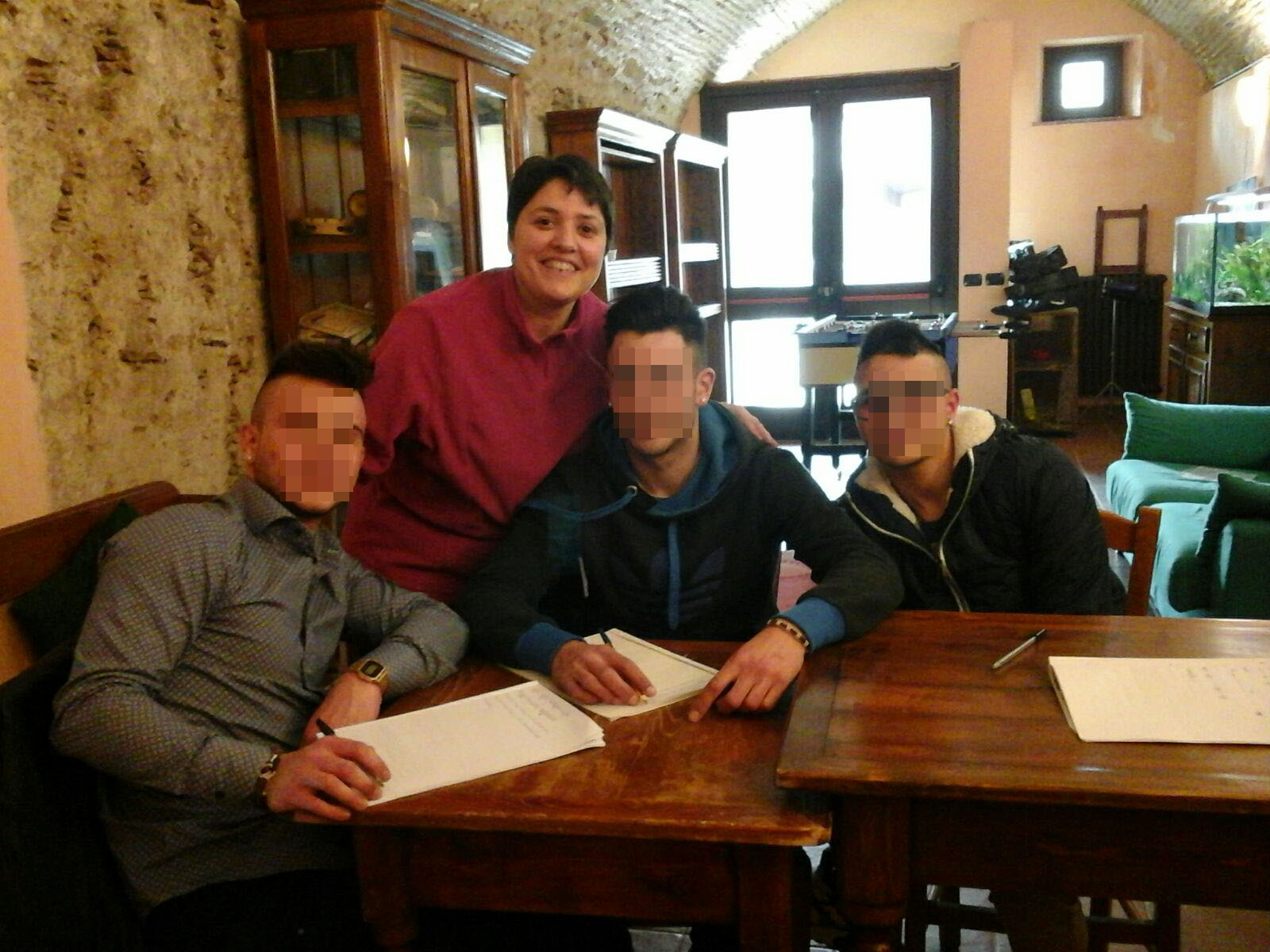 Today in Italy we care for the homeless, and the women who decide to escape from the trafficking of migrants, and work with the Caritas. We offer our help and consultancy also in the framework of the families: new unions, separations and divorce. We also work in the prisons and with minors, etc. Over the last six years I have worked as a teacher in Messina – I have a degree in Educational Sciences – in a therapeutic community for youths subjected to the control of the Juvenile Courts. I used to visit them to help them discover their importance in society. They would often say: “When you are with us, we feel the presence of something beautiful and good, could this be Jesus?” Recently, my superiors received a request for someone to work under a permanent contract, in the prisons of the Philippines and with street kids. I was assigned the job since the experience I have acquired in this field could be of great help. I have already said yes to God and do not want to back out just now. In September I shall leave for six months, to see if I can give my contribution there.”
Today in Italy we care for the homeless, and the women who decide to escape from the trafficking of migrants, and work with the Caritas. We offer our help and consultancy also in the framework of the families: new unions, separations and divorce. We also work in the prisons and with minors, etc. Over the last six years I have worked as a teacher in Messina – I have a degree in Educational Sciences – in a therapeutic community for youths subjected to the control of the Juvenile Courts. I used to visit them to help them discover their importance in society. They would often say: “When you are with us, we feel the presence of something beautiful and good, could this be Jesus?” Recently, my superiors received a request for someone to work under a permanent contract, in the prisons of the Philippines and with street kids. I was assigned the job since the experience I have acquired in this field could be of great help. I have already said yes to God and do not want to back out just now. In September I shall leave for six months, to see if I can give my contribution there.”

 “The World Forum for Peace” will be held in Brazil, in the city of Florianópolis, during 22-25 September.
“The World Forum for Peace” will be held in Brazil, in the city of Florianópolis, during 22-25 September. 





 There was must festivity on August 14th at José C. Paz, fifty kilometres from Buenos Aires,
There was must festivity on August 14th at José C. Paz, fifty kilometres from Buenos Aires,  In 1999, with the support of the Focolare that had a meeting hall nearby, some local residents got together to do something for the newcomers. First they tried to identify the main issue for the barrio. It turned out to be the need for a safe place where children and teenagers could be welcomed and taken off the streets. This is how the “Juntos Por El Barrio” Project was begun. An academic support programme was set up in a makeshift classroom. Seeing how successful it was, receiving distance support from the Focolare’s New Families non-profit association (
In 1999, with the support of the Focolare that had a meeting hall nearby, some local residents got together to do something for the newcomers. First they tried to identify the main issue for the barrio. It turned out to be the need for a safe place where children and teenagers could be welcomed and taken off the streets. This is how the “Juntos Por El Barrio” Project was begun. An academic support programme was set up in a makeshift classroom. Seeing how successful it was, receiving distance support from the Focolare’s New Families non-profit association (
 “I come from a simple family in the province of Naples. In my town, my father, a special deacon of the Eucharist, was in charge of the sick and the poor, who had in some way become members of our household. I was14 when dad passed away due to a tumour. I suffered so much, and in that time I didn’t believe that God was taking care of us, as he had always said. I threw myself into my studies, with the objective of earning lots of money to build a house of my own. At the age of 20 God appeared once more in my life: a group of friends had invited me to a meeting of which I honestly remember nothing; the only thing that pushed me to frequent succeeding ones was the joy I saw amongst them, and which was lacking in my life. I excelled in my studies, and had many friends but was not happy like them. I wanted to get to know more about this God they spoke to me about, and after a few years, also what I wanted to do with my life. I was introduced to my congregation almost by chance. To be sincere, I didn’t hold the nuns in great esteem. In my region the convent is still regarded as an escape from the world: and this certainly was not the life I wanted! I am a joyful, happy person and l love being with people. I had a degree and also many boyfriends. But in this religious family I found the love of my life – God, to whom I couldn’t say no. This was the house I had sought ever since I was an adolescent, but now with an addition: I was no longer alone, but had other sisters who loved Jesus, like me. My religious family – the Franciscan nuns of the Poor – had met the
“I come from a simple family in the province of Naples. In my town, my father, a special deacon of the Eucharist, was in charge of the sick and the poor, who had in some way become members of our household. I was14 when dad passed away due to a tumour. I suffered so much, and in that time I didn’t believe that God was taking care of us, as he had always said. I threw myself into my studies, with the objective of earning lots of money to build a house of my own. At the age of 20 God appeared once more in my life: a group of friends had invited me to a meeting of which I honestly remember nothing; the only thing that pushed me to frequent succeeding ones was the joy I saw amongst them, and which was lacking in my life. I excelled in my studies, and had many friends but was not happy like them. I wanted to get to know more about this God they spoke to me about, and after a few years, also what I wanted to do with my life. I was introduced to my congregation almost by chance. To be sincere, I didn’t hold the nuns in great esteem. In my region the convent is still regarded as an escape from the world: and this certainly was not the life I wanted! I am a joyful, happy person and l love being with people. I had a degree and also many boyfriends. But in this religious family I found the love of my life – God, to whom I couldn’t say no. This was the house I had sought ever since I was an adolescent, but now with an addition: I was no longer alone, but had other sisters who loved Jesus, like me. My religious family – the Franciscan nuns of the Poor – had met the  Today in Italy we care for the homeless, and the women who decide to escape from the trafficking of migrants, and work with the Caritas. We offer our help and consultancy also in the framework of the families: new unions, separations and divorce. We also work in the prisons and with minors, etc. Over the last six years I have worked as a teacher in Messina – I have a degree in Educational Sciences – in a therapeutic community for youths subjected to the control of the Juvenile Courts. I used to visit them to help them discover their importance in society. They would often say: “When you are with us, we feel the presence of something beautiful and good, could this be Jesus?” Recently, my superiors received a request for someone to work under a permanent contract, in the prisons of the
Today in Italy we care for the homeless, and the women who decide to escape from the trafficking of migrants, and work with the Caritas. We offer our help and consultancy also in the framework of the families: new unions, separations and divorce. We also work in the prisons and with minors, etc. Over the last six years I have worked as a teacher in Messina – I have a degree in Educational Sciences – in a therapeutic community for youths subjected to the control of the Juvenile Courts. I used to visit them to help them discover their importance in society. They would often say: “When you are with us, we feel the presence of something beautiful and good, could this be Jesus?” Recently, my superiors received a request for someone to work under a permanent contract, in the prisons of the